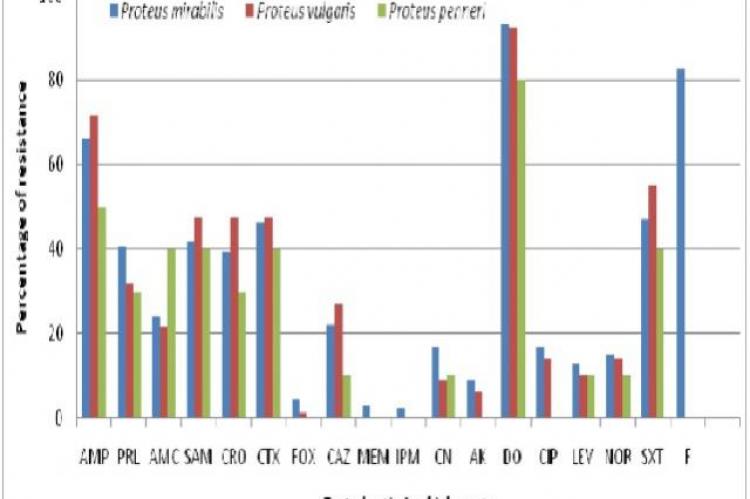Beta-lactams and fluoroquinolones antibiotics are widely used in treatment of bacterial infections including those caused by Proteus species. Wild-type strains of Proteus spp. are usually susceptible to these antibiotics. Development of resistance to such antibiotics severely limits therapeutic options and complicates the treatment process. This study aimed to investigate the prevalence of some genes that confer resistance to beta-lactams and fluoroquinolones among clinical isolates of Proteus spp. A total of 220 Proteus isolates were selected from 1547 clinical specimens collected from patients attended 4 Egyptian local hospitals during the period from October 2014 till March 2017. Fifty one of the Proteus isolates exhibited multidrug resistance (MDR). Those MDR Proteus isolates were resistant to extended spectrum cephalosporins; such resistance was revoked on the use of β-Lactamase inhibitor such as clavulanic acid. These isolates were tested phenotypically for the production of extended spectrum beta-lactamases (ESBLs) and genotypically for detection of blaTEM and aac(6′)Ib-cr genes. TEM Results: 33/51 (64.7%) of isolates showed phenotypic ESBL production by double disc diffusion synergy test; whereas 36/51 (70.58%) of isolates showed identical results on using the combination disc method. Genotypically: Among the 25 tested MDR isolates, 11 isolates (44%) showed positiveTEM bla gene encoding and 5 isolates (20%) showed the presence of aac(6′)Ibcr gene.: Beta-lactams and fluroquinolones co-resistance due to encoding of blaTEM and aac(6′)Ib-cr genes has been well identified among clinical isolates of Proteus spp. in Egypt.
View:
- PDF (1.05 MB)


